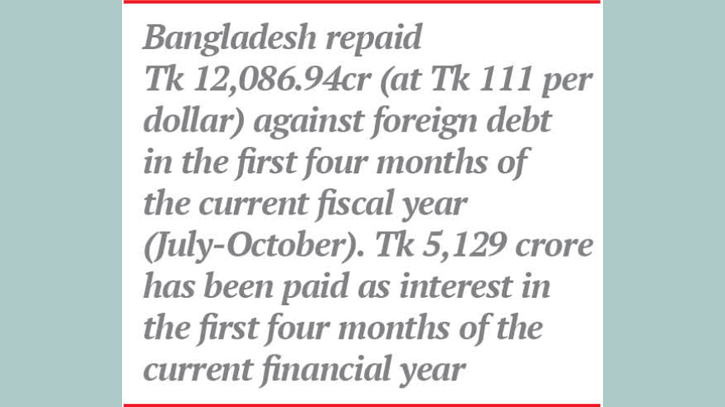
Photo: Messenger
Bangladesh is witnessing a growing apprehension regarding the repayment of foreign debt. Within the span of just one year, the country has experienced a twofold increase in foreign loan repayments, accompanied by a more than doubling of interest payments.
According to data from the Economic Relations Division (ERD), Bangladesh repaid Tk 12,086.94 crore (at Tk 111 per dollar) against foreign debt in the first four months of the current fiscal year (July-October). Tk 6,906.23 crore was paid during the same period of the previous financial year 2022-23. Tk 5,129 crore has been paid as interest in the first four months of the current financial year, compared to Tk 1,786 crore paid as interest during the same period in the last fiscal year.
Furthermore, development partners have reduced promised loan concessions. According to ERD data, in the first four months from July to October of the current financial year, the cost of paying interest on foreign debt has increased by 52 percent compared to the same period of the previous financial year. A total of $110.14 crore has been disbursed in the last four months, compared to $72.43 crore in the same period of the previous financial year. In other words, in the first four months of the current financial year, the cost of interest and principal repayment of foreign loans has increased by $37.72 crore.
According to related sources, in addition to economic complications, the government's market-based debt has increased. Simultaneously, the floating interest rate has also risen. Two years ago, one of the benchmarks for determining global interest rates (Secured Overnight Financing Rate or SOFR on market-based debt) was below 1 percent; it has now risen to 5 percent. As a result, the pressure of foreign debt repayment has increased. Interest payments have surged by 176 percent in the first quarter of the current financial year compared to the same period of the previous year.
Economists note that interest rates on foreign debt have risen since the country achieved lower-middle-income status in 2015. Additionally, extra interest is charged on SOFR, one of the benchmarks for determining global interest rates, at a rate of 5 percent. At this rate, many short-term loans, such as budgetary assistance, have to pay interest. In such loans, the grace period is relatively short, and the interest rate is high. Due to these reasons, principal-interest has to pay more interest in recent months.
According to officials of the ERD, the repayment of principal for notable projects, such as the Bangabandhu Sheikh Mujibur Rahman Tunnel Project, begins after the end of the grace period, which is one of the reasons for this increase.
According to the ERD report, the cost of foreign debt interest payments increased by 149 percent in the first four months of the current fiscal year, amounting to a total of $46.74 crore. In the same period of the last financial year, this figure was $18.77 crore.
On the other hand, the actual repayment of foreign loans increased by 18.17 percent, totaling $63.40 crore between July and October. In the same period of the last financial year, the amount was $53.65 crore. In other words, the actual payment has increased by $9.75 crore compared to the same period of the last financial year.
Interest payments in Bangladeshi currency have surged by 75 percent in the last four months compared to the same period of the previous fiscal year. A total of Tk 12,087 crores of loan interest have to be paid in the last four months, whereas in the same period of the last financial year, this amount was only Tk 6,906 crore. This indicates an increase of Tk 5,181 crore in the first four months of the current financial year compared to the same period of the last financial year.
In this context, Dr. Mustafizur Rahman, a distinguished fellow at the Center for Policy Dialogue (CPD), told The Daily Messenger, “Considering export income and remittance flow, the overall foreign debt repayment situation has not yet reached an alarming level. However, in this situation, one should be very careful when taking new loans, seeking low-interest options. Additionally, project implementation work should be done on time because implementation delays also increase costs.”
Notably, Bangladesh has initiated several large infrastructure projects in the last decade, including the Metro Rail, Padma Bridge Rail Link, Matarbari Power Station, Karnaphuli River Tunnel, Hazrat Shahjalal International Airport's third Terminal, Payra Sea Port, and Rooppur Nuclear Power Plant. To implement such significant projects, commercial loans are obtained from Russia, China, and India.
Messenger/Disha








